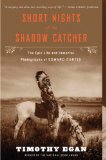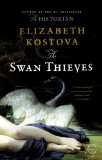Summary | Excerpt | Reading Guide | Reviews | Beyond the book | Read-Alikes | Genres & Themes | Author Bio

A Novel
by Marianne WigginsThe Shadow Catcher's twin
narratives follow the life of photographer Edward S
Curtis (1868-1952) and his wife Clara Philllips
(about whom little is known, giving the author's
creativity free rein); and "Marianne Wiggins",
living in present-day California, who has written a
book about Curtis that has drawn the interest of
film-makers.
In an interview on PBS radio (see
sidebar for link), Wiggins explains that she has
never written autobiography (although parts of
herself do come through in other books) but this
time she was drawn to explore the central mystery in
her own live - why her father, who she loved very
much, disappeared from her life when she was young.
The story that has been passed down to her is that,
some years after disappearing, her father was found
dead in a national park by a milkman, apparently
having committed suicide. Unable to verify the truth
of this, Wiggins has played with the bare facts as
known to her to create the fictionalized modern-day
thread of The Shadow Catcher.
I was set to dislike The Shadow Catcher
having read a damning review that complained that it
contained an excess of implausibilities and symbolic
coincidences, and that the two storylines failed to
gel into a whole and, most damning of all, that the
line between fact and fiction was overly blurred,
reinforced by the disclaimer on the opening page
that states that "the novel is not intended to be
understood as describing real or actual events, or
to reflect in any way upon the actual conduct of
real people."
In fact, I'm not entirely clear how the book found
its way on to my nightstand in the first place but,
on balance, I'm glad it did. Certainly, coincidence
does play a heavy role in The Shadow Catcher,
as it has tended to do in other novels by Wiggins,
but the book offers more than enough strongly
developed characters and themes to compensate (added
to which, Wiggins implies that some of these
'coincidences' are taken from her own life -
and as we all know, fact can often be stranger than
fiction).
The Shadow Catcher explores multiple themes
including identity, the exploitation of native
peoples and the human need to create heroes out of
ordinary people. The core thematic connection
between the two storylines is the mystery of a
child's love, even hero-worship, of a largely absent
father. Even though for much of their childhood
Curtis had been absent from their lives, his
children apparently doted on him, engraved his
gravestone with the words, "Beloved Father" and
chose to be buried near him. In parallel, Marianne
Wiggins (both the fictional and real version) lost
her beloved father at an early age and, more than
thirty years later, still seeks evidence of him.
When categorizing books by genre for BookBrowse I
have been struck by the thought that a novel is
simply a name for a book that doesn't fit neatly
into any one genre. The Shadow Catcher is
such a "novel" - combining two parallel storylines,
one historical fiction, one contemporary; plus a
dollop of autobiography, art criticism (supported by
30 interleaved photos) and travelogue. The result is
an intelligent, socially conscious book that defies
categorization.
![]() This review was originally published in The BookBrowse Review in September 2007, and has been updated for the
June 2008 edition.
Click here to go to this issue.
This review was originally published in The BookBrowse Review in September 2007, and has been updated for the
June 2008 edition.
Click here to go to this issue.

If you liked The Shadow Catcher, try these:

Short Nights of the Shadow Catcher
by Timothy Egan
Published 2013
How a lone man's epic obsession led to one of America's greatest cultural treasures: Prize-winning writer Timothy Egan tells the riveting, cinematic story behind the most famous photographs in Native American history -- and the driven, brilliant man who made them.

by Elizabeth Kostova
Published 2010
Kostova's masterful new novel travels from American cities to the coast of Normandy, from the late 19th century to the late 20th, from young love to last love. The Swan Thieves is a story of obsession, history's losses, and the power of art to preserve human hope.
People who bite the hand that feeds them usually lick the boot that kicks them
Click Here to find out who said this, as well as discovering other famous literary quotes!
Your guide toexceptional books
BookBrowse seeks out and recommends the best in contemporary fiction and nonfiction—books that not only engage and entertain but also deepen our understanding of ourselves and the world around us.